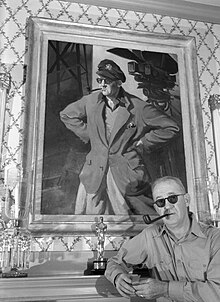Portal:Television
The Television Portal

Television (TV) is a telecommunication medium for transmitting moving images and sound. Additionally, the term can refer to a physical television set, rather than the medium of transmission. Television is a mass medium for advertising, entertainment, news, and sports. The medium is capable of more than "radio broadcasting", which refers to an audio signal sent to radio receivers.
Television became available in crude experimental forms in the 1920s, but only after several years of further development was the new technology marketed to consumers. After World War II, an improved form of black-and-white television broadcasting became popular in the United Kingdom and the United States, and television sets became commonplace in homes, businesses, and institutions. During the 1950s, television was the primary medium for influencing public opinion. In the mid-1960s, color broadcasting was introduced in the U.S. and most other developed countries.
In 2013, 79% of the world's households owned a television set. The replacement of earlier cathode-ray tube (CRT) screen displays with compact, energy-efficient, flat-panel alternative technologies such as LCDs (both fluorescent-backlit and LED), OLED displays, and plasma displays was a hardware revolution that began with computer monitors in the late 1990s. Most television sets sold in the 2000s were flat-panel, mainly LEDs. Major manufacturers announced the discontinuation of CRT, Digital Light Processing (DLP), plasma, and even fluorescent-backlit LCDs by the mid-2010s. LEDs are being gradually replaced by OLEDs. Also, major manufacturers have started increasingly producing smart TVs in the mid-2010s. Smart TVs with integrated Internet and Web 2.0 functions became the dominant form of television by the late 2010s. (Full article...)
Selected article -
"all things" is the seventeenth episode of the seventh season of the American science fiction television series The X-Files. Written and directed by lead actress Gillian Anderson, it first aired on April 9, 2000, on the Fox network. The episode is unconnected to the wider mythology of The X-Files and functions as a "Monster-of-the-Week" story. Watched by 12.18 million people, the initial broadcast had a Nielsen household rating of 7.1. The episode received mixed reviews from critics; many called the dialogue pretentious and criticized the characterization of Scully. However, viewer response was generally positive.
The series centers on Federal Bureau of Investigation (FBI) special agents Fox Mulder (David Duchovny) and Dana Scully (Anderson) who work on cases linked to the paranormal, called "X-Files". Mulder is a believer in the paranormal. The skeptical Scully was initially assigned to debunk his work, but the two have developed a deep friendship. In this episode, a series of coincidences lead Scully to meet Dr. Daniel Waterston (Nicolas Surovy), a married man with whom she had an affair while at medical school. After Waterston slips into a coma, Scully puts aside her skepticism and seeks out alternative medicine to save Waterston.
Selected image -

A teleprompter (also known as an autocue) is a display device that prompts the person speaking with an electronic visual text of a speech or script. Using a teleprompter is similar to the practice of using cue cards.
Did you know (auto-generated) -

- ... that television production companies working in Bhadun, Bangladesh, can hire a local woman as an extra for ৳500 (US$5.30) per day?
- ... that Paul Dini was a writer for both the animated television series Batman: The Animated Series and the video game series Batman: Arkham?
- ... that Angeline Quinto has recorded songs for at least 35 films and television soundtracks in the Philippines?
- ... that Colin Mackay, the political editor at Scottish Television, was "very sad" when Colin MacKay, the political editor at Scottish Television, died?
- ... that in 1982, a news anchor for Phoenix television station KOOL-TV was held hostage on set for five hours?
- ... that John Wesley Shipp, who played the Flash in the 1990 television series, was cast as his father in the pilot episode of 2014's The Flash?
Selected quote -
More did you know
- ...that noitulovE, a cinema and television advertising campaign for Guinness draught stout, won more awards than any other commercial worldwide in 2006?
- ...that The O.C.'s music supervisor Alexandra Patsavas worked in the music department of over fifty Roger Corman B-movies before her television debut?
- ...that the ABC television network created controversy when they licensed and produced a doll based on fictional rapist Todd Manning?
- ...that the color signals of Israel Broadcasting Authority television transmissions were erased until 1981, to insure equality for families who couldn't afford color-tv?
- ...that Great American Country television host Nan Kelley (then Nan Sumrall) became Miss Mississippi in 1985 after her fellow Mississippian Susan Akin was crowned Miss America?
Selected biography -
William Bradley Pitt (born December 18, 1963) is an American actor and film producer. He is the recipient of various accolades, including two Academy Awards, two British Academy Film Awards, two Golden Globe Awards, and a Primetime Emmy Award. One of the most influential celebrities, Pitt appeared on Forbes' annual Celebrity 100 list from 2006 to 2008, and the Time 100 list in 2007.
Pitt first gained recognition as a cowboy hitchhiker in the Ridley Scott road film Thelma & Louise (1991). His first leading roles in big-budget productions came with the drama films A River Runs Through It (1992) and Legends of the Fall (1994). He also starred in the horror film Interview with the Vampire (1994), alongside Tom Cruise. He gave critically acclaimed performances in David Fincher's crime thriller Seven (1995) and the science fiction film 12 Monkeys (1995). The latter earned him a Golden Globe Award for Best Supporting Actor and his first Academy Award nomination. (Full article...)






























































